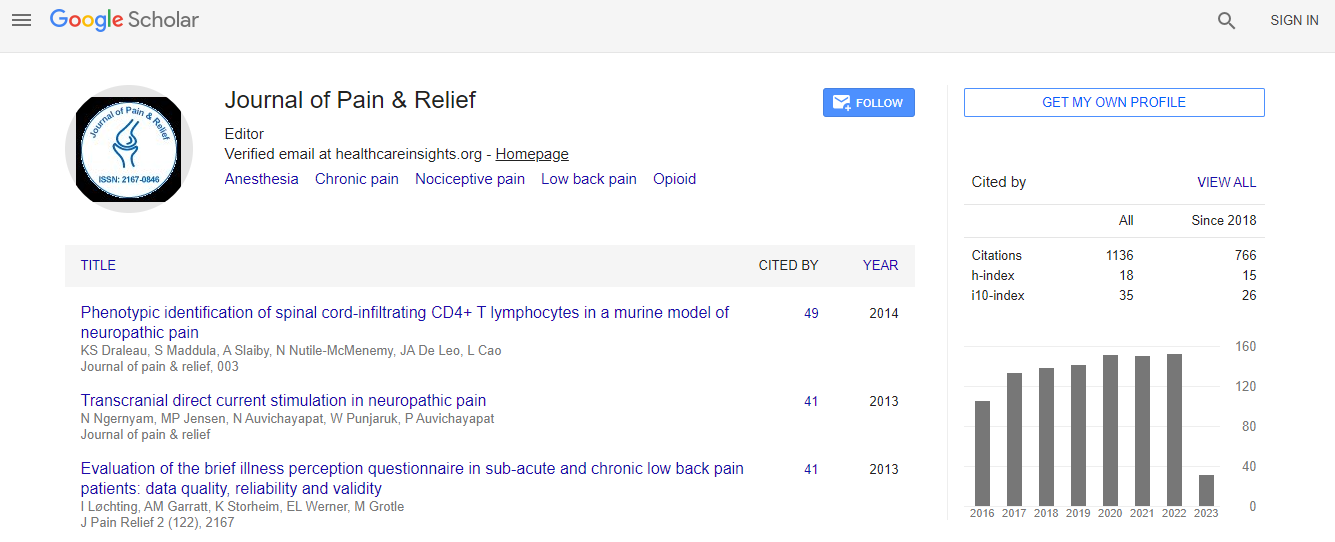Our Group organises 3000+ Global Conferenceseries Events every year across USA, Europe & Asia with support from 1000 more scientific Societies and Publishes 700+ Open Access Journals which contains over 50000 eminent personalities, reputed scientists as editorial board members.
Open Access Journals gaining more Readers and Citations
700 Journals and 15,000,000 Readers Each Journal is getting 25,000+ Readers
Recommended Conferences
42nd Global Conference on Nursing Care & Patient Safety
Toronto, CanadaGoogle Scholar citation report
Citations : 1556
Journal of Pain & Relief received 1556 citations as per Google Scholar report
Journal of Pain & Relief peer review process verified at publons
Indexed In
- Index Copernicus
- Google Scholar
- Open J Gate
- Genamics JournalSeek
- Cosmos IF
- RefSeek
- Hamdard University
- EBSCO A-Z
- OCLC- WorldCat
- Publons
- Geneva Foundation for Medical Education and Research
- Euro Pub
- ICMJE
Useful Links
Recommended Journals
Related Subjects
Share This Page
Magnetic stimulation ameliorates pain-emotion via activation of descending inhibitory system: Similar effect of antidepressant drugs
International Conference on Fibromyalgia and Chronic Pain
T Furuta, K Fukuhara, S Tominaga and T Ishikawa
Nipro co., Japan
Posters & Accepted Abstracts: J Pain Relief
Abstract
Depression-like behaviour is often complicated by chronic pain. A lack of 5-HT and/or BDNF can result in pain-depression. In fact, antidepressants imipramine (IMI) increases 5-HT along with BDNF mRNA. Moreover, magnetic stimulation (MS) can evoke 5-HT release of spinal cord. However, the induction of BDNF with MS has not been established. We aimed to investigate depression with chronic pain modulates BDNF synthesis and to evaluate the effect of MS with induction of BDNF comparing from IMI. A chronic constriction injury (CCI) was constructed in S-D rats. MS was consequently exposed to skin located injury site. In other rats, IMI was administered after CCI. Hyperalgesia was assessed by paw withdrawal latency (PWL) using plantar test. The depression was used forced swim test. Anterior cingulate cortex (ACC) and rostal ventromedial medulla (RVM) samples for 5-HT and BDNF (ELISA) contents and also BDNF mRNA expression (RT-PCR) were removed. CCI rats showed a significant reduction in PWL of the injured leg to thermal stimuli with time. Both MS and IMI-treated rats reduced hyperalgesia and an increased immobility time that were reversed by anti-BDNF antibody and 5, 7-DHT. Analgesia effects of MS were antagonized by naloxone. MS was also reduced decrease in BDNF mRNA. This study clearly shows that a lack of 5-HT coupled with BDNF in the descending inhibitory system leads pain-emotion. MS ameliorates this symptom by activating 5-HTergic neurons by spinal microdialysis associated with induction of BDNF. Moreover, these effects were similar actions to those of antidepressant, IMI, which suggests that MS activates 5-HTergic neurons concurrent with an interaction of BDNF.Biography
T Furuta has completed his MS at Yamaguchi University and is employed at Major Research Institute. He is an expert of Neurobehavior and protein analysis.
Email: furuta-tsubasa@nipro.co.jp

 Spanish
Spanish  Chinese
Chinese  Russian
Russian  German
German  French
French  Japanese
Japanese  Portuguese
Portuguese  Hindi
Hindi 
